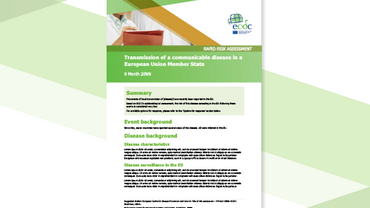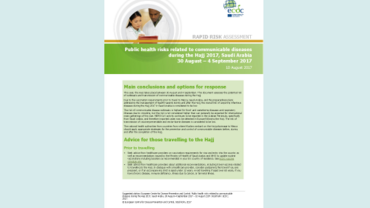Rapid Risk Assessment: Severe respiratory disease associated with Middle East Respiratory Syndrome Coronavirus (MERS-CoV)
As of 18 July 2013, 88 confirmed cases of MERS-CoV had been reported worldwide of which 45 have been fatal. To date, all cases have either occurred in the Middle East or have had direct links to a primary case infected in the Middle East. Saudi Arabia has reported 68 cases including 38 deaths. Thirteen cases have been reported from outside of the Middle East. These 13 cases resulted from seven separate chains of transmission. The primary case for each chain had been infected in the Middle East.
The risk of importation of MERS-CoV to the EU is unchanged and sporadic importation of cases is expected to continue. The reservoir of the virus is unknown and behavioural risk factors that are critical for transmission in the Middle East have not been established.
This update, in particular, includes travel advice for those considering visiting Saudi Arabia for the Umrah and Hajj pilgrimage following the recommendations made by the Saudi Ministry of Health. No travel or trade restrictions are recommended.
Executive Summary
The latest and sixth update of ECDC Rapid Risk Assessment on Middle East respiratory syndrome coronavirus (MERS-CoV) addresses:
- Epidemiological situation since publication of the previous Rapid Risk Assessment of 18 June
- Travel advice for those planning to visit Saudi Arabia for the Umrah or Hajj pilgrimage, as issued by the Saudi Ministry of Health
- The risk of importation to the EU in light of recent information, notably a modelling study published in The Lancet (which concluded that the risk for pandemic spread was low).
As of 18 July 2013, 88 confirmed cases of MERS-CoV had been reported worldwide of which 45 have been fatal. To date, all cases have either occurred in the Middle East or have had direct links to a primary case infected in the Middle East. Saudi Arabia has reported 68 cases including 38 deaths, Jordan two cases, who both died, and United Arab Emirates five cases.
Thirteen cases have been reported from outside of the Middle East in UK (4), Italy (3), France (2), Germany (2) and Tunisia (2). These 13 cases resulted from seven separate chains of transmission. The primary case for each chain had been infected in the Middle East and local secondary transmission was reported from four countries: UK, France, Italy and Tunisia.
The reservoir of the virus is unknown and behavioural risk factors that are critical for transmission in the Middle East have not been established.
The risk of importation of MERS-CoV to the EU is unchanged and sporadic importation of cases is expected to continue. In line with the WHO advice, no travel or trade restrictions are recommended.
People travelling to the Middle East from Europe need to be aware of the presence of MERS-CoV in this area and of the small risk of infection. EU Member States may consider active information efforts for travellers to risk areas. Travellers who develop symptoms during travel or up to 14 days after their return are encouraged to seek medical attention, sharing their history of travel.







